Mormon Main St. Plaza Video Shows Conflict, but no kiss
The Salt Lake Tribune obtained the LDS Main St. Plaza security-film through an open-records request from Salt Lake City. The newly released security-film footage shows a scuffle break out between LDS security guards and the gay couple.
Charges Dropped Against Mormon Plaza Gay Kissers
The Salt Lake City prosecutor’s office says it will not pursue charges against two men who were cited for trespassing on a Mormon church-owned downtown plaza earlier this month.
Prosecutor Sim Gill said in a statement that “when you have private property that is open to the public…there is some responsibilities of the property owner”. Gill also said that Utah state law requires the property owner to let the public know what rules to follow. It will be interesting to see if the LDS Church puts signs up on the Plaza explaining exactly what type of affection can be displayed and by what sexes.
The Church of Jesus Christ of Latter-day Saints has disputed Aune’s and Jones’ version of the events, saying their behavior was lewd and more was involved than a “simple kiss of the cheek.”
To those who are about to take the bar exam: We salute you!
Today is the first day of the bar exam for many states. Tens of thousands aspiring lawyers will spend the next two or three days in examination hell, all for the chance to practice law in the jurisdiction of their choice. And statistically speaking, a significant minority of those exam takers will fail the exam and have to retake it.
The bar exam is the legal profession’s greatest single rite of passage. Whether your view it as a necessary evil or a self-protective barrier to entry, there is no avoiding the bar exam (unless you live in Wisconsin). Reform efforts in this area have met enormous opposition, since the legal profession is extremely slow to change. But it has gotten better — many states now offer the option to use computers for the essay portion of the bar exam. I would have gladly taken that option, especially when rigor mortis set in on my writing hand in the afternoon of the essay portion.
One of the best proposals I have seen this year was from George Mason Law prof Ilya Somin, who suggests that law examiners and other state bar officials should be required to take and pass the bar exam every year. Somin continues:
Any who fail to pass should be immediately dismissed from their positions, and their failure publicly announced (perhaps at a special press conference by the state attorney general). And they should be barred from ever holding those positions again until – you guessed it – they take and pass the exam.
After all, if the bar exam covers material that any practicing lawyer should know, then surely the lawyers who lead the state bar and administer the bar exam system itself should be required to know it. If they don’t, how can they possibly be qualified for the offices they hold? Surely it’s no excuse to say that they knew it back when they themselves took the test, but have since forgotten. How could any client rely on a lawyer who is ignorant of basic professional knowledge, even if he may have known it years ago?
Of course, few if any bar exam officials or state bar leaders could pass the bar exam without extensive additional study (some might fail even with it). That’s because, as anyone who has taken a bar exam knows, they test knowledge of thousands of arcane legal rules that only a tiny minority of practicing lawyers ever use. This material isn’t on the exam because you can’t be a competent lawyer if you don’t know it. It’s there so as to make it more difficult to pass, thereby diminishing competition for current bar association members (the people whose representatives, not coincidentally, control the bar exam process in most states – either directly or through their lobbying efforts). Effectively, bar exams screen out potential lawyers who are bad at memorization or who don’t have the time and money to take a bar prep course or spend weeks on exam preparation.
That seems like an appropriate remedy to me, but it doesn’t have a snowball’s chance in hell of being implemented. Still, one can dream.
We here at Mormon Lawyers wish everyone taking the bar exam this week the best of luck. To those who are about to take the exam: we salute you!
What is the Mormon view of capital punishment?
Twice in the last week the death penalty has come up in conversation, and it got me thinking about it. The first was actually in a job interview: I recently applied to a government position that required occasional work on habeus actions, including some capital cases. The interviewer said the office had used conscience waivers in the past, but they were difficult to coordinate. I honestly hadn’t given the death penalty much thought prior to that moment. In fact, I have been pretty agnostic on the subject. I don’t really oppose it, but the death penalty isn’t something I cheer about.
The topic came up again over the weekend as various news media outlets around the Southeast began to report on the jury selection process in a high-profile kidnapping-rape-murder trial of a Knoxville couple. Prosecutors are seeking the death penalty for all four defendants. Prosecutors are seeking the death penalty for all four defendants, and the cases are generating a enough controversy in Knoxville that the jury had to be picked from another city
My own ambivalence as to the death penalty doesn’t mean other Mormons don’t have strong feelings on the matter. Many Mormons feel that that capital punishment is inconsistent with Christian doctrines of forgiveness and mercy. Others oppose it because they feel that we should not judge in matters of life and death.
On the other hand, there are apparently some Mormons who believe in a theory of “blood atonement,” where forgiveness of some sins can only be obtained by execution. There is some disagreement about what “blood atonement” means, but that’s the gist of it. Clint wrote a post last February about a murder trial in Ogden, Utah, in which the defense attorney sought to exclude all Mormons from the jury who might believe in a “blood atonement.” I’ve never known anyone who espoused this theory, but it apparently comes from a few statements made by Brigham Young and other Mormon leaders in the 19th Century. The theory definitely hasn’t been taught in Mormon congregations in my lifetime, but it may have had some support as recently as fifty years ago. Take, for example, this excerpt from Joseph Fielding Smith’s Doctrines of Salvation:
“Man may commit certain grievous sins… that will place him beyond the reach of the atoning blood of Christ…. If these offenses are committed, then the blood of Christ will not cleanse them from their sins even though they repent. Therefore their only hope is to have their own blood shed to atone…” (Doctrines of Salvation, Vol. 1, pp. 133-138)
I should note that this statement doesn’t necessarily advocate capital punishment. It could just as well be interpreted as saying that forgiveness will have to wait until after an individual’s death. Such an interpretation might not even be contrary to current Mormon teachings. But at least some people take it to mean that the death penalty should be administered in certain cases. Bruce R. McConkie also references the “blood atonement” theory by name in his oft-quoted Mormon Doctrine.
I notice that both Doctrines of Salvation and Mormon Doctrine aren’t official publications of the Mormon Church, and both are known to include teachings that are disavowed by Mormon leaders. But both works are still used with some regularity by some Mormons, so perhaps it isn’t surprising that some people would still believe in the blood atonement theory.
After my interview I thought about my opinion on capital punishment, and out of curiosity, I looked up the LDS Church’s official statement on the subject. The official position is almost as ambivalent as my own:
The Church of Jesus Christ of Latter-day Saints regards the question of whether and in what circumstances the state should impose capital punishment as a matter to be decided solely by the prescribed processes of civil law. We neither promote nor oppose capital punishment.
That official statement seems to expressly disavow any dogma that advocates the death penalty for certain offenders. I can’t find any good information as to whether the “blood atonement” theory was ever an official doctrine of the LDS Church, but it seems safe to say that it isn’t now. I also think it’s safe to say that this belief is a rarity within Mormonism. If it was ever more prevalent among American Mormons, that has changed as Mormonism has evolved into a world religion. The majority of the membership of the Mormon Church lives outside the United States, and most countries do not even allow capital punishment.
Pioneer Day
Today is Pioneer Day, a day that is a state holiday in Utah and more or less ignored in the rest of the world. I actually think Pioneer Day is interesting, even though I’ve never so much as been to a Pioneer Day parade. Most major religions have their own specific holidays, complete with historical traditions and costumes. Pioneer Day gives Mormons their chance to remember historical events, dress up in old-timey clothing, have parades, and shoot off fireworks. What more could you ask for in a holiday?
The Pew Forum on Religion and Public Life chose this Pioneer Day to issue a report entitled “A Portrait of Mormons in the U.S.” The report is chock-full of interesting statistics that compare American Mormons with other religious traditions. Look for other Mormon bloggers to delve into this date in the next few days — it’s a wealth of interesting information.
Mormon leaders meet with President Obama
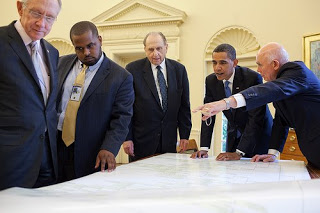
Yesterday President Barack Obama had a meeting with President Thomas S. Monson of the Church of Jesus Christ of Latter-day Saints. Two well-known Mormon lawyers also attended the meeting — Elder Dallin H. Oaks and Senator Harry Reid of Nevada. Along with President Obama, the majority of the attendees of the meeting were J.D.’s, although all three men are better known for their roles outside the traditional legal profession. With so many lawyers in the room, perhaps it was inevitable that legal issues came up in conversation. Senator Reid later indicated that he was “glad that President Obama and Elder Oaks had an opportunity to discuss their shared passion of the law.” I admit I would have liked to have listened in on the conversation between the state-supreme-court-justice-turned-Mormon-apostle and the law-professor-turned-leader-of-the-free-world.
As they have done with the past two American presidents, the Mormon Church leaders presented President Obama with his family history, including a large-scale family tree (pictured above).
New Zealand High Court Sides Against Mormon Church In IP Challenge
A New Zealand High Court found in favor of Robert Sintes for his use “family search”. Sintes of Auckland, is the owner of familytracing.co.nz which specializes in locating the living lost. The LDS Church owned Intellectual Reserve, Inc. (IRI), objected to his use of the phrase “family search” on his website. IRI, owns the LDS Church’s intellectual property, including copyrights and trademarks. IRI, was seeking to avoid confusion by both groups using the same phrase on their websites.
familysearch.org is a free family research service provided by the Church of Jesus Christ of Latter-day Saints to the public.
LDS Church Clarifies Record Of Plaza Kissing Incident
On Friday the LDS Church released a statement regarding the two men arrested on Main Street Plaza for engaging in inappropriate behavior. Unlike what I’ve read from other articles covering this story these men were “engaging in behavior deemed inappriopriate for any couple on the Plaza. There was much more involved than a simple kiss on the check.” Below is a copy of the press release in its entirety.
“There has been a good deal of publicity surrounding an incident where two men were cited for trespassing because of belligerent and profane behavior on the Church Plaza, which is an extension of the Salt Lake City Temple grounds and Church headquarters. While this property is owned by the Church, we want it to be a place of beauty and serenity in downtown Salt Lake City for everyone.
As we said earlier on this matter, these men were asked to stop engaging in behavior deemed inappropriate for any couple on the Plaza. There was much more involved than a simple kiss on the cheek. They engaged in passionate kissing, groping, profane and lewd language, and had obviously been using alcohol. They were politely told that the Plaza was not the place for such behavior and asked to stop. When they became belligerent, the two individuals were asked to leave Church property. Church security detained them and Salt Lake City police were called.
There is nothing satisfying in learning that there have been problems for anyone on Church property. We hope the Plaza will continue to be an asset to the community and enjoyed by the many that cross it each day.”
Mormon Missionary Murderer Seeks New Trial
In January 2006, James Boughton Jr. of Chesapeak, Virginia murdered Mormon missionary Elder Morgan W. Young and shot his missionary companion Elder Joshua Heidbrink. Boughton shot the two missionaries because he feared hat may have witnessed him attempt to shoot a nearby person after a drug deal went bad.
In December 2008, Boughton was convicted of first-degree murder, malicious wounding, attempted malicious wounding and three counts of use of a firearm and was sentenced to 38 years.
Boughton alleges juror misconduct during his three week trial. Before Chesapeak Circuit Court Judge Randy Smith on Friday, Boughton’s attorney Andrew Sacks said a juror complained to other panel members about defense tactics. The judge did not immediately rule on the motion but said that he would issue a written ruling in several weeks.
JRCLS – DC Interviewing Workshop
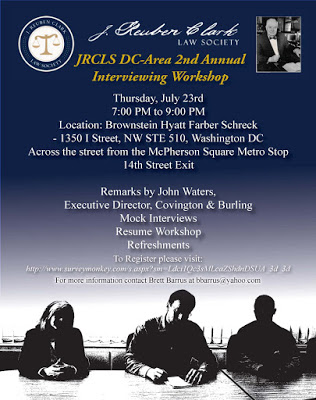
Registration for the 2nd Annual JRCLS DC-Area Interviewing Workshop is due JULY 18th!!!
This event is a great opportunity to practice for recruiting events and on-campus interviews which will be occurring later this summer and into the fall.
The event will take place on Thursday July 23, 2009 at the law offices of Brownstein Hyatt Farber Schreck, LLP from 7:00 PM to 9:00 PM.
John Waters, Executive Director of Covington and Burling will be speaking about the current hiring climate due to the economic recession and how to market yourself to firms. Members of the JRCLS professional chapter will be assisting with mock interviews and there will be an attorney from Brownstein on-hand to review resumes and offer pointers on how to enhance them.
Legal Briefs: Judge Sotomayor, Big Love trademark violations, and more
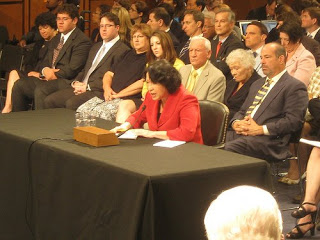
- Four BYU Law profs are among over a thousand signatories of a letter sent to the Senate Judiciary Committee in support of the confirmation of Judge Sotomayor to the Supreme Court. Mormon Times.
- The University of Utah has issued a cease and desist letter to HBO for violating the university’s trademark in a “Big Love” episode. Deseret News.
- From the Wrong-Way-to-Do-Things Department, a New Zealand man beat his daughter in the head with a piece of cinder block after she refused to go to with him to his Mormon congregation. She won’t be going to church with him any time soon — he received a 12-month sentence for the offense. NZ Herald.
- The Utah Bar Association is suing an LDS attorney who allegedly preyed on illegal immigrants and stole their money without providing immigration services. KUTV.com.
- Utah Attorney General Mark Shurtleff reported in a radio interview that child bride marriages have all be halted in the state of Utah. KSL.com.
Athiests Sue to Block ‘In God We Trust’ Engraving
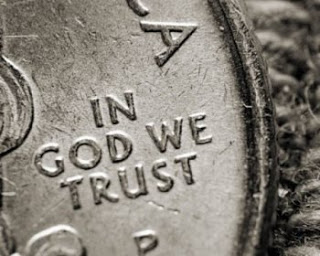
The Freedom From Religion Foundation filed a lawsuit Tuesday seeking to block an architect from engraving “In God We Trust” and the Pledge of Allegiance at the Capital Visitor Center in Washington D.C. The lawsuit claims the taxpayer-funded engraving would be an unconstitutional endorsement of religion.
The Visitor Center took years to build and cost $621 million. The “In God We Trust” engravings are estimated to only add $100K to the project. The foundation is also challenging the constitutionality of the National Day of Prayer.
Is putting “In God We Trust” on a building or coin really an endoresement of religion? Does this really violate the separation between church and state? I don’t think this case has merit and should be shot down pretty easily.
No smooching allowed on Mormon Main Street Plaza
Last week two gay men were arrested in the Main Street Plaza portion of Mormon Temple Square. Derek Jones and Matthew Aune were walking through the Plaza when one kissed the other on the cheek. They were then approached by security personnel asked to cease their public display of affection or to leave the premises. Apparently the Mormon Church has a policy against PDA in the area. Jones and Aune reportedly refused the request, responded with profanity, and were arrested for trespassing.
The background of the Plaza has been contentious. The Mormon Church purchased the land from the city in 2003 in a land swap deal, but the exchange was plagued by lawsuits almost from the get-go. The ACLU sued along with other parties, challenging the deal as unconstitutional because the Church could then limit speech on the property that had formerly been a public forum. The LDS Church eventually won the lawsuit and prohibited a variety of activities in the plaza, including protesting, smoking, sunbathing, and offensive conduct of any sort. The prohibition against protesting didn’t stop a group on Sunday that participated in a “kiss-in, ” but they were promptly shooed off the property when police arrived. No citations were issued.
As a matter of legal rights, I think the Mormon Church or any other private or religious organization is free to set whatever silly rules it wants. My only concern in this case is the issue of notice. I have visited Salt Lake City, but I don’t know if any signs are posted in the area with a code of conduct. Particularly given that the Plaza was once public property, some signage seems appropriate. Nevertheless, even without signage, this restriction is probably safely on the side of legality, even though it’s terrible PR. It’s also worth noting that the PDA rule is apparently enforced on both heterosexual and homosexual couples, though that doesn’t enter into my analysis of the policy’s legality.
For a first-hand discussion of the Plaza and the enforcement of the PDA rule, I recommend Ryan’s post on the subject Right Juris.
J. Reuben Clark Law Society Publishes It’s First Newsletter
Adding to Peter’s article from last week about the new J. Reuben Clark Law Society Web Site. The JRCLS also published it’s innaugural Newsletter which can be viewed HERE. As you can imagine I think this is a great idea and I’m very excited to see future editions of the JRCLS Newsletter.
I also know that the JRCLS Law School’s are working on their own version of the Newsletter.
Legal Briefs: Undocumented Immigrants – Missionaries and PDA
- Reaching out to undocumented immigrants soften immigration views of LDS missionaries. Salt Lake Tribune
- Gay couple detained near Main Street Plaza after kiss. After being asked to leave the private property the two men became hostile and refused; they were both cited with misdemeanor trespassing. AP
Illegal Aliens as Mormon Missionaries
The Salt Lake Tribune recently wrote an article highlighting the problem the LDS Church is facing with it’s missionaries who are illegally living in the United States, yet serving full-time missions. According to the Tribune, would-be missionaries who are “undocumented” are now being assigned only to “state-side” missions where they will have a decreased chance of having problems with immigration issues. Immigration attorneys are assisting to resolve these immigration problems.
We have also discussed this issue in the past, after Jose Calzadillas was detained by Customs and Border patrol agents in the Cincinnati International Airport for not having proper identification after attempting to fly home after successfully completing his mission in Ohio.
We have also discussed a separate yet similar topic of LDS missionaries knowingly baptizing illegal aliens into the Church and the moral issues that raises.
If the LDS Church continues to knowingly baptize illegal aliens and allows them to serve full-time missions it will put them in the awkward position of having to publicly defend their support of people who are not obeying the law.
New JRCLS website
If you are a member of the J. Reuben Clark Law Society or ever use their online resources, you may be interested to learn that the JRCLS website was redesigned this week. While it still isn’t anything cutting-edge, I think the new site is much more usable than the old one. The new site makes better use of multimedia materials and has a well-designed bar across the top with drop-down menus for various pages and materials.
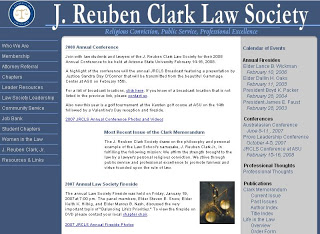
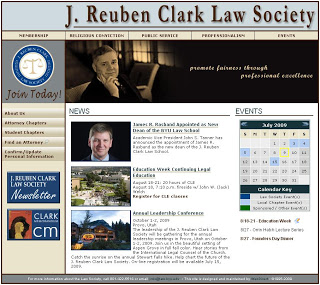
Hopefully this new attention to the website will be accompanied by more resources and more frequent updates. The old site often went weeks or months without updates.
Ryan Marshall a “Super Star” Lawyer
SALT LAKE CITY, July 1 /PRNewswire/ — Brinks Hofer Gilson & Lione, one of the largest intellectual property law firms in the United States, is pleased to announce that Ryan L. Marshall, an intellectual property attorney based in the Salt Lake City, Utah office of the firm, has been named a Super Lawyers “Mountain States Rising Star” in intellectual property law for 2009 in a survey conducted by Law & Politics magazine. The Mountain States region consists ofIdaho, Montana, Nevada, Utah and Wyoming.
Mr. Marshall prosecutes patent applications in the chemical, pharmaceutical and biochemical arts in the U.S. and abroad. Mr. Marshall also litigates intellectual property and unfair competition claims. He received his J.D. from the J. Reuben Clark Law School, an M.S. in organic chemistry and a B.S. in chemistry, all from Brigham Young University.
Law and Politics surveyed lawyers in the “Mountain States” region, representing 70 practice areas, and asked them to identify the best lawyers they had personally worked with or had observed in action. Attorneys from firms of all sizes were considered as well as those in private practice, prosecutors, in-house counsel and public service lawyers.
The “Rising Stars” category recognizes lawyers that are under the age of 40 or have been in practice for 10 years or less. While up to 5 percent of lawyers in the state are named as Super Lawyers, no more than 2.5 percent are named to the Rising Stars list.
The complete list appears in the 2009 Mountain States Super Lawyers magazine and in select consumer magazines.
New alcohol laws take effect in Utah
We would be remiss if we didn’t mention the new Utah state alcohol laws that took effect last week. While none of the blog’s current contributors live in Utah, it’s impossible to ignore the role that the Mormon Church has played in alcohol control policy in the state where a majority of the residents are at least nominally adherents to the faith. The new Utah laws abandon the 40-year-old requirement that bar patrons fill out an application, pay a fee and become a member of a private club. The private club rules were a quintessentially Utah oddity for many years, but they were most noticed during the 2002 Salt Lake Olympics.
I’ve never quite understood the rationale of the private club rule. By most accounts, the rule was not much of a barrier to drinking, and in some parts of the state (such as Park City) it wasn’t even enforced. So the private club rule doesn’t appear to have restricted alcohol consumption. It seems to have had more of a social stigma function, requiring drinkers to be “on a list.” In that respect, the updated law hasn’t changed much. The Associated Press reports:
The [Mormon] Church has always helped shape alcohol policy here, and the change to the law this year was no different. Only after consultation with church leaders and an agreement that DUI penalties would be stiffened, did lawmakers make progress on the changes.
As part of the agreement, Utah also became the only state in the country to require bars to scan the ID of anyone who appears to be 35 or younger to ensure their ID is valid. Bars store the information for a week so law enforcement can inspect it.
Anyone who has an ID that doesn’t properly scan is required to fill out a form logging their presence at the bar.
Utah alcohol laws still have quite a few quirks. That same AP article notes that flavored malt beverages may not be sold at grocery or convenience stores, the percentage of alcohol in beer is capped at 3.2%, happy hours are illegal, and cocktails must be mixed out of the sight of customers.
As a policy matter, I think the new law is at least a step in the right direction, particularly the harsher DUI penalties. I would rather see some more creative solutions, such as those that I discussed earlier this year involving alcohol tax equal to the average marginal social cost of each drink.
Study dispels myth of high Utah bankruptcy rate
I’ve heard several people cite the statistic that Utah has one of the highest bankruptcy law in the nation as evidence that members of the Mormon Church are falling into the consumerist trap and “living outside their means.” I’ve always thought that was a strange assertion; I don’t live in Utah, but I’ve traveled there on occasion and I never saw anything that indicated that Utah residents spent more or less of their incomes than residents of other states. Apparently I wasn’t the only one suspicious of this oft-quoted statistic — two Brigham Young University professors of economics have an article in The Journal of Law & Economics that at least in part dispels that myth.
In their article entitled “Explaining the Puzzle of Cross‐State Differences in Bankruptcy Rates,” Lars Lefgren and Frank McIntyre make the argument that the variation in bankruptcy rates is due primarily to differences in state laws. Specifically, they found that laws governing the garnishment of wages significantly impacted bankruptcy rates. This actually makes a lot of sense — if your state’s laws prevent your creditors from garnishing your wages, you are less likely to need the the protections afforded by filing bankruptcy. On the other hand, if your creditors can get at your paycheck, you have a strong incentive to file for bankruptcy as soon as possible. Lefgren and McIntyre also found, somewhat unsurprisingly, that rates of bankruptcy were highest in areas where the median household income was between $30,000 and $60,000.
So it appears that Utah’s relatively high rate of bankruptcy (7.05 per thousand households) has more to do with its laws allowing creditors to garnish the wages of debtors than it does a particular trend among Utah residents or a Mormon subset of that population. Utah allows up to the federal limit of 25% of wages to be garnished, although it does impose a 6-month limit. In the Southeastern United States where I live, many states use the federal garnishment limit and have similarly high bankruptcy rates. Tennessee leads the pack with 8.12 bankruptcies per thousand households, with Alabama (7.42) and Georgia (7.38) not far behind.
The article is a bit dense, but it does a good job at dispelling some of the myth that Utah residents are spending like there’s no tomorrow. The bankruptcy data doesn’t support that assertion, and in fact, it turns out that the state-by-state data isn’t very useful to map trends, due to the differences in state laws.